Success at WO
Jr. Bella Aguirre [Not her real name] just got done taking her test for AP Literature and feels tired, but accomplished. As the bell rings, Aguirre walks out of her AP Spanish classroom. Since English is not her first language, she has to try ten times harder in her classes. Despite her hardships, she maintains A’s and is viewed as an overachiever. “I have a couple of classes with Aguirre this year and so I have been very lucky to get to know her. Not only is she a nice person, she is extremely smart and her stories about living in Cuba and how much it differs from America are super intriguing. She is a super smart girl and she thrives in school. ” Jr. Danielle Lebster said.
Choosing to keep her identity private for the sake of her safety, Aguirre was still brave in sharing her former life in Cuba. In AP Spanish, Aguirre decided to teach the class during a half day. “Three weeks ago she brought her own activity to help the class communicate in Spanish and asked if we could do this instead. She is the type of student who takes the initiative to help others.” Professora Aguilera said.
However it wasn’t always easy for Aguirre to take the initiative.
Growing up in Cuba
Aguirre had a sense that living in Cuba limited her capability to achieve her goals. “Since I was young, the first thing they told me in one of my Spanish classes was that we had to hate the United States and its people. They told us that the U.S was constantly lying to us and that Cuba held the one and only truth.” Young elementary schoolers were learning propaganda in their curriculum to support the regime and no other countries. Government teachers would lecture about America’s lack of healthcare and gun control. The regime hoped that advertising against America with stories of homeless people dying in the streets would gain more commitment to Cuba.
Life at home in Cuba was bad. The regime had too much influential power over their citizens yet with little resources. “I usually woke up because there wasn’t electricity, so it was hot and humid and I couldn’t sleep. I remember that and if there was any bread, I would just eat bread or if there was any milk I would just drink milk. Normally there wasn’t. It wasn’t because I was poor; it was because there weren’t the resources to produce milk or bread daily. “
Regime Control
Not only was Aguirre aware of the regime’s lies, but multiple young Cuban citizens were also dreaming of one day leaving the regime. Stuck in the same routine and feeling oppressed under the regime’s control, she felt trapped. “I would study and do my homework and everything until midnight. Sometimes when it was really dark, and I had to study with candles because I had a test the next day and Cuba is so rigorous with school. I couldn’t even charge my phone to use the flashlight because of limited electricity.” There was no hope even after graduating school Aguirre would be stuck in the same cycle. Living in communism you pay to go to school just to end up not getting paid well. An average Cuban doctor makes $2,700 annually compared to an American doctor who gets paid $294,000. Even Aguirre’s peers knew studying was pointless.
Despite this, Aguirre had to keep her head low and follow the regime’s commands. “I remember one of my last assignments before leaving Cuba was why capitalism doesn’t work. I Googled it and everything said communism doesn’t work so I was like what do I do, do I lie? I did what I had to do because I could get an F or worse. The worst punishment is not that you get an F if you say the regime is bad. Your parents can go to jail and you can get in trouble,” Aguirre said. She battled to keep her secret hidden from not only her closest friends, but government spies on every corner. To protect her family and her only hope to escape, Aguirre smiled and acted normal. She was always respectful especially when government men with long sticks were patrolling Cuban streets.
Ever since Aguirre was a little girl, she wanted to have something the regime did not have over her head. Something in her own control. She wanted to feel independent, and she prepared for America so she began to learn the English language. “I learned English because I knew that there was more than what they taught me. I felt like English was my escape, like my way of escaping that reality. I learned English to win. To win something that they didn’t have.” Aguirre said.
When her teacher overheard her speak English, she was pulled out of class and cornered. “One of my English teachers assumed I wanted to leave Cuba because I spoke English. He was a double spy; he was an English teacher and also a government employee. They’re everywhere and so he asked me ‘Be honest with me, you want to leave Cuba right? That’s why you know English.’” Aguirre said. She was caught off guard yet said no quickly. She walked back into class where she heard gossip of the latest kids who just left Cuba. Aguirre started to daydream of what America would be like when she would get there. She was excited. Hopeful.
Aguirre never felt free when living in Cuba. She felt that her only purpose was to study, praise the regime, and pretend Cuba is a great country. Only allowing Cuban citizens limited internet access, the regime would monitor conversations and block websites that went against Cuban virtues. All organizations were controlled by the regime and to Aguirre the window of escape was closing. No free speech, limited electricity, low salary were all obstacles in Aguirre’s future.
Final Days in Cuba
“I think my biggest dream was always to be able to dream.”
Aguirre marked off another date on her calendar. Only three days until she would flee Cuba and start her new life in America. Having to say goodbye to her friends was making her nauseated. She could not leave her room because she was too scared and she could not talk to anyone. Fear of the regime stopping her from leaving her home country controlled her.
“I couldn’t tell my friends. I told only three of my friends a week before leaving and I knew for two years that I was going to escape. I felt like I had a lump in my throat whenever we were talking about our future and I knew they were gonna stay and they weren’t gonna have the same opportunities I would have,” Aguirre said. She kept her secret for two years but eventually had to face her friends and say her goodbyes.
The Planning Process
Aguirre and her family were prepared to voyage off to America with all legal documents when a global disease spread and all traveling was shut down. Aguirre and her family were forced to stay in Cuba for another two years. “When Covid started, there was a huge economic crisis not only in the world but in Cuba especially since it is already a third world country. It intensified everything that was going on and we decided we wanted to leave. When Covid came and everyone was on lock down so we just waited for an opportunity. My dad passed the south border first. Then once we found out he made it, my mom, brother, and I came after. ” Aguirre said. Getting to the airport to board their flight to Canada, Aguirre’s mother was stopped by a regime employee telling her Aguirre’s old passports were also required to board. This was a false requirement in order to stop Cuban citizens from leaving the country legally, but they still boarded and finally landed to reunite with family members in the area. Finally, after a long car ride, they crossed the Canadian border and safely made it to the United States.
Life in America
Arriving in America had its own struggles. No longer being able to contact her friends and family back in Cuba made Aguirre feel lonely. Depression took over and Aguirre wanted nothing more than to see her friends’ pictures and be able to FaceTime. She reminded herself that here she could be more than the regime wanted her to be. Then a year later she moved to Holland, Michigan. Enrolling in West Ottawa High School presented Aguirre with opportunities she dreamed of.
However, her Cuban roots still impact her in America. “In school everything is different. I have four AP classes so I have to put in more work. For instance, I’m a senior now so I have to apply to college but I do not know how to apply to college because I didn’t even know that I had to until I got here. So that really impacts my life because I have no clue how the system works.” Aguirre said. Although English may be a challenge Aguirre continues to persevere through her schoolwork and one day become a doctor. “That is what my mom and my uncle and my grandfather were and not only to continue the family tradition but to also take good care of people is something good to aspire to and I hope I can become a doctor someday. And actually be paid for it. ” Aguirre says. Aguirre hopes her story can bring awareness to the unseen and unheard youth of Cuba.







